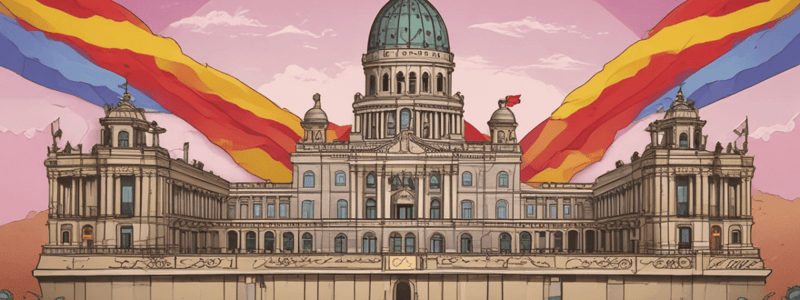Podcast
Questions and Answers
¿Cuál es el nombre del poder legislativo en España?
¿Cuál es el nombre del poder legislativo en España?
- Congreso de los Diputados
- Senado
- Cortes Generales (correct)
- Asamblea Nacional
¿Cuál es el papel del monarca en España?
¿Cuál es el papel del monarca en España?
- Jefe del gobierno
- Ceremonial y simbólico (correct)
- Jefe del ejército
- Líder del partido político en el poder
¿Cuál es uno de los derechos fundamentales establecidos en la Constitución española de 1978?
¿Cuál es uno de los derechos fundamentales establecidos en la Constitución española de 1978?
- Derecho a la vivienda
- Derecho a la justicia gratuita
- Derecho a la propiedad
- Derecho a la educación (correct)
¿Cuántas comunidades autónomas hay en España?
¿Cuántas comunidades autónomas hay en España?
¿Qué mayoría se requiere para reformar la Constitución española?
¿Qué mayoría se requiere para reformar la Constitución española?
¿Qué es necesario para ratificar una reforma constitucional?
¿Qué es necesario para ratificar una reforma constitucional?
¿Cuál es el nombre del poder judicial en España?
¿Cuál es el nombre del poder judicial en España?
¿Cuál es una de las responsabilidades del monarca en España?
¿Cuál es una de las responsabilidades del monarca en España?
Study Notes
Separation of Powers
- The Spanish Constitution of 1978 establishes a separation of powers between the legislative, executive, and judicial branches.
- The Constitution divides power between:
- The Cortes Generales (Legislative): a bicameral parliament composed of the Congress of Deputies and the Senate.
- The Government (Executive): headed by the Prime Minister, responsible for executing the law.
- The Judiciary (Judicial): independent and composed of the Supreme Court, Audiencias, and other lower courts.
Monarchy
- The Spanish Constitution of 1978 establishes a parliamentary monarchy, where the monarch serves as the head of state.
- The monarch's role is primarily ceremonial and symbolic, with limited powers.
- The monarch is responsible for:
- Representing the state internationally.
- Appointing the Prime Minister.
- Dissolving the Cortes Generales.
- Signing laws into effect.
Fundamental Rights
- The Spanish Constitution of 1978 enshrines a set of fundamental rights and freedoms, including:
- Equality: before the law and in the exercise of rights.
- Freedom of speech and expression.
- Freedom of association and assembly.
- Right to life and physical integrity.
- Right to education and cultural development.
- Right to health and social security.
- Right to work and fair labor conditions.
Autonomous Communities
- The Spanish Constitution of 1978 establishes a decentralized state, with 17 Autonomous Communities (ACs) and two Autonomous Cities.
- The ACs have a significant degree of autonomy, with powers to:
- Govern their own affairs.
- Manage their own finances.
- Establish their own laws and regulations.
- Provide public services.
Constitutional Reform
- The Spanish Constitution of 1978 can be reformed through a complex process, involving:
- A two-thirds majority in both the Congress of Deputies and the Senate.
- A referendum to ratify the reforms.
- The reform must be approved by the Cortes Generales and then ratified by the Spanish people.
- The Constitution has been reformed several times, with the most significant reform being the 1992 reform, which introduced changes to the judiciary and the Autonomous Communities.
Separación de Poderes
- La Constitución Española de 1978 establece la separación de poderes entre los tres órganos del Estado: Legislativo, Ejecutivo y Judicial.
- El poder legislativo recae en las Cortes Generales, un parlamento bicameral compuesto por el Congreso de los Diputados y el Senado.
- El poder ejecutivo está en manos del Gobierno, encabezado por el Presidente del Gobierno, responsable de ejecutar la ley.
- El poder judicial es independiente y se compone del Tribunal Supremo, Audiencias y otros tribunales inferiores.
Monarquía
- La Constitución Española de 1978 establece una monarquía parlamentaria, donde el monarca actúa como jefe de Estado.
- El monarca tiene un papel principalmente ceremonial y simbólico, con poderes limitados.
- El monarca es responsable de representar al Estado en el ámbito internacional, nombrar al Presidente del Gobierno, disolver las Cortes Generales y aprobar leyes.
Derechos Fundamentales
- La Constitución Española de 1978 establece una serie de derechos y libertades fundamentales, incluyendo:
- Igualdad: ante la ley y en el ejercicio de los derechos.
- Libertad de expresión y asociación.
- Derecho a la vida y la integridad física.
- Derecho a la educación y desarrollo cultural.
- Derecho a la salud y seguridad social.
- Derecho al trabajo y condiciones laborales justas.
Comunidades Autónomas
- La Constitución Española de 1978 establece un Estado descentralizado, con 17 Comunidades Autónomas (CA) y 2 Ciudades Autónomas.
- Las CA tienen un alto grado de autonomía, con poderes para gobernar sus asuntos, administrar sus finanzas, legislar sus propias leyes y regulaciones, y prestar servicios públicos.
Reforma Constitucional
- La Constitución Española de 1978 puede ser reformada a través de un proceso complejo que implica:
- Moción de confianza: una mayoría de dos tercios en ambas cámaras del parlamento.
- Referéndum: la reforma debe ser aprobada por la mayoría de los ciudadanos españoles.
- La Constitución ha sido reformada en varias ocasiones, con la reforma más importante siendo la reforma de 1992, que introdujo cambios en la judicatura y las Comunidades Autónomas.
Studying That Suits You
Use AI to generate personalized quizzes and flashcards to suit your learning preferences.
Description
Aprende sobre la separación de poderes en la Constitución española de 1978, incluyendo los roles del legislativo, ejecutivo y judicial.




